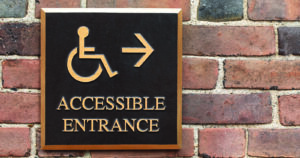Property Owners and Property Managers ADA Compliance, by Jennifer Sherven, Esq., 6-22-2023
The Americans With Disabilities Act (ADA) prohibits public accommodations from discriminating against people with disabilities. This means property owners and management companies need to be specifically aware of their responsibilities in complying with the ADA.
Failure to comply may lead to fines/penalties, lawsuits, and other problems.
Understanding the ADA & Public Accommodations
Under the ADA, public and common use areas at public accommodations need to be accessible to persons with disabilities.
A person with a disability is defined as someone who:
- has a physical or mental impairment that substantially limits one or more major life activities,
- has a history or record of such an impairment (such as cancer that is in remission), or
- is perceived by others as having such an impairment (such as a person who has scars from a severe burn).
It can be challenging keeping up with ever-changing laws and requirements, but there are some key areas property owners should pay attention to laid out below.
Parking
Just simply offering ample parking spaces does not necessarily satisfy ADA requirements. In parking lots or garages, accessible parking spaces must be located on the shortest accessible route to the accessible entrance, according to Department of Justice ADA home page. Accessible parking spaces must have access aisles. Access aisles provide a designated area for people who use wheelchairs or other mobility devices to get in and out of their car or van, according to ADA.gov. Keep in mind accessible parking spaces must be provided for both cars and vans and there are specific requirements for size, slope, and signage that must be adhered to.
Service Animals
Generally speaking, even if your property has a no pets policy, property owners cannot discriminate against a disabled person that requires a service animal. Under the ADA, a service animal is a dog of any breed or size that is trained to perform a task directly related to a person’s disability. For example, a person may have a dog that is trained to retrieve objects for them.
Older Buildings
Some property owners and managers may believe that if a building was constructed before 1991, when the DOJ issued rules implementing Title III, then they are exempt from obligations. But the DOJ has specific Title III regulations that applies to existing buildings under 28 C.F.R. Section 36.304. It states that “a public accommodation shall remove architectural barriers in existing facilities, including communication barriers that are structural in nature, where such removal is readily achievable, i.e., easily accomplishable and able to be carried out without much difficulty or expense.” Examples they offer of steps to remove barriers from public spaces include installing ramps and making curb cuts in sidewalks and entrances. If a public accommodation can demonstrate that barrier removal is not readily achievable, they are not necessarily off the hook and may have to achieve accessibility through alternative methods, if those methods are readily achievable.
Websites
Public accommodations need to ensure their websites are accessible to persons with disabilities. Website accessibility has been a hot-button issue for ADA-related claims and lawsuits. Plaintiffs’ attorneys allege that inaccessible web content means that people with disabilities are denied equal access to information. Examples of website accessibility barriers include poor color contrast that could impact persons with limited vision or color blindness, lack of text alternatives on images, and no captions on videos.
Risks of Non-Compliance
Complaints may be filed with the DOJ, which enforces ADA. The Department is authorized to bring a lawsuit where there is a pattern or practice of discrimination in violation of Title III, or where an act of discrimination raises an issue of general public importance, according to the DOJ. Plaintiffs can also bring private lawsuits against public accommodations by filing directly in court.
Kaufman Dolowich Can Help
Kaufman Dolowich’s team of employment law attorneys can assist with ADA compliance including:
- Defending property owners/public accommodations against ADA lawsuits.
- Responding to DOJ investigations.
- Assessing client’s properties, policies, and practices regarding accessibility.
- Offering guidance on barriers that may hinder accessibility and applicable solutions including those concerning website accessibility.
Jennifer Sherven, Partner, concentrates her practice in representing management in all areas of employment litigation, including discrimination, harassment, retaliation, sexual assault, and wage and hour violations. She represents employers, including public and private education providers, in federal and state courts and in administrative proceedings in federal, state, and local human rights agencies.










